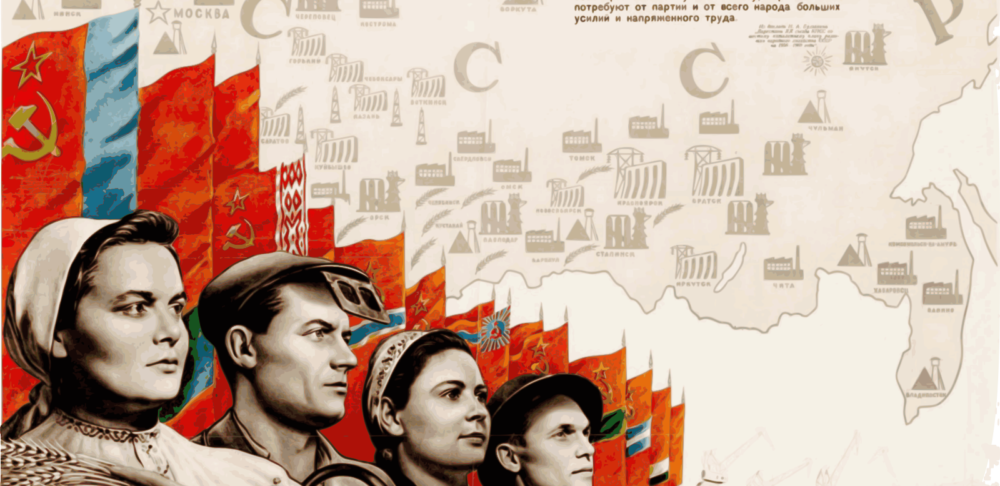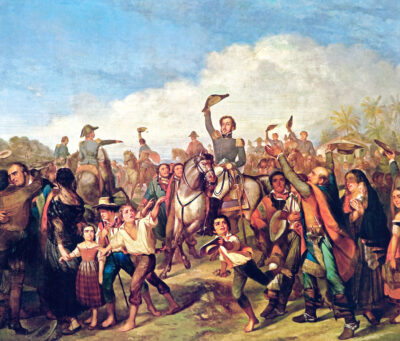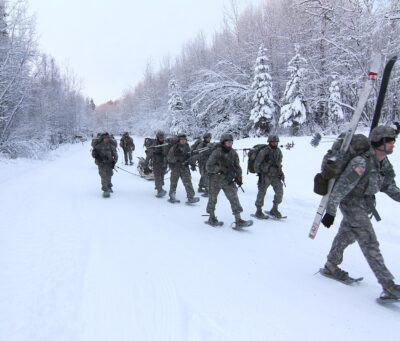As Russia menaced Ukraine last year, I was learning about a time when Moscow was much more powerful than it is now. Taking a course on the Soviet Union was my attempt to understand the country Winston Churchill once called “a riddle wrapped in a mystery inside an enigma.” [1]
The seminar spanned the Second World War to the collapse of the Soviet Union in 1991. We learned about the Soviets’ trials and tribulations, from the gulag to glasnost. Particularly thoughtful discussions included whether the Soviet system deserved credit for defeating the Nazi war machine and whether its economy performed better than critics alleged. Notwithstanding differences of interpretation, everyone agreed the Soviet Union was a worthy subject of inquiry.
Yet you would not know it from enrollment. With me were just nine other graduate students, seven of whom were pursuing master’s degrees. The companion course on the Stalinist years had comparably low numbers. Not one other person in my PhD cohort is specializing in Russian or Soviet history. Forgive me for concluding that scholars my age are just not that interested in studying the Soviet Union.
Empirical evidence backs my experience. According to a 2015 report by the Association for Slavic, East European, and Eurasian Studies, there is an “unmistakable decline in interest and numbers” within the field. [2] This part of the world’s waning importance may be alienating prospective students. So could academic theories about systemic racism and white supremacy. Whatever the cause, the result is fewer and fewer scholars of the Soviet Union.
This is to the detriment of U.S. foreign policy. At a time when the United States faces great-power threats not seen in a generation, we do not have enough people studying how things went the last time around. Russian President Vladimir Putin called the Soviet Union’s collapse “the greatest geopolitical catastrophe of the century,” which serves as an explanation for his present aggression in Eastern Europe and beyond. [3] The sources of the Russian Federation’s conduct lie in its Soviet predecessor.
Soviet history also bears on our other key rival. If the United States and China are entering a “Second Cold War,” scholars should be doing their utmost to tease out lessons from the first: how American policymakers confronted the Soviets can tell us about how their twenty-first century successors should approach China. Through my own archival research, I discovered that even when U.S.-Soviet interests aligned, such as in preventing and ending war in the Middle East, confrontation accompanied cooperation. It is my contention that superpowers cannot ignore their broader disputes for the sake of shared interests, whether with the Soviets or Chinese. But as much as we must stand up to this Communist Party’s depredations, we do not want a bout of nuclear brinkmanship akin to the Cuban Missile Crisis. Keeping this Cold War from turning hot demands we reckon with relevant historical cases.
Some might retort that likening today’s conflict with China to the Cold War is a waste of time. According to this view, the two are discrete historical moments that we must analyze on their own terms. To study one is to realize how little it has in common with the other. Such arguments are unpersuasive. Although it is true this Cold War is unlike the last in several ways, not least the difference between the U.S.-Soviet economic relationship and the U.S.-China economic relationship today, would anyone claim they are so dissimilar we cannot draw out common threads? After all, the Soviet Union squared off against a country that by and large resembles the one in which we now live. Then a democratic superpower with an often-liberal worldview, the United States remains as much. We must not let the historical inconsistencies blind us to foundational truths across time and space.
The decline in Soviet studies has gone hand in hand with the decline in diplomatic and military history. [4] The irony is that as the historical profession has abandoned the study of hard power, there is a growing appetite outside the academy for books, movies, and podcasts about war and peace. Historians today study subjects that, whatever their merits, do not address the pressing challenges of our moment. More offerings on Soviet history will help right the ship.
The problem is not the lack of good writing on the Soviet Union. Recent books by Ian Ona Johnson of Notre Dame and Simon Miles of Duke examine the pre-war Soviet-German partnership and U.S.-Soviet diplomacy in the 1980s. [5] [6] The field should welcome more research like theirs. By bringing the Soviet example to light, we provide implicit and explicit recommendations for policymakers grappling with challenges of their own.
Aside from U.S. foreign policy, studying the Soviet Union helps adjudicate the battle of ideas. A recent survey by John Bitzan and Clay Routledge found that 32 percent of college students viewed socialism positively, compared to 24 percent who viewed capitalism positively. [7]To prove the courage of their convictions, the former should examine how Lenin, Stalin, and Khrushchev ruled what was then the world’s preeminent socialist state. After reading about the economic misery and ideological unraveling within the Soviet Union, they might emerge with a different view. Or they might not. Before drawing their own conclusions about socialism, students should learn about one of the most notable political experiments in history. Russian philosopher Pytor Chaadayev wrote in 1829 that his compatriots “exist only in order to teach some great lesson to the world.” [8] He died well before the Russian Revolution, but we can study the tragedy of socialism he did not live to see.
This does not mean students must all start learning Russian and reading everything by Aleksandr Solzhenitsyn and Robert Conquest (I certainly am not). But it does mean we should seek out opportunities to study the Soviet Union where they exist and ask for them where they do not.
For starters, Political Science and History departments should set aside more PhD slots for Sovietologists each year. Eastern European and Eurasian Studies centers should similarly require that BA and MA students take at least a few courses on the Soviet period. Outside of academia, grant-making institutions should generously fund research in the field. True-blue Soviets would hate to admit it, but capital begets productivity.
Although Churchill struggled to understand the Soviets, he never stopped trying. We must not either.
Daniel J. Samet ’25 serves on the Executive Board of the AHS chapter at the University of Texas at Austin, where he is a PhD student in History.
—
Notes:
[1] Winston Churchill, “The Russian Enigma,” 1 October 1939, http://www.churchill-society-london.org.uk/RusnEnig.html.
[2] Theodore P. Gerber, “The State of Russian Studies in the United States:
An Assessment by The Association for Slavic, East European, and Eurasian Studies (ASEEES),” July 2015, https://www.aseees.org/sites/default/files/downloads/FINAL-ASEEES-assessment-report_0.pdf.
[3] “Putin: Soviet Collapse a ‘Genuine Tragedy,’” NBC News, 25 April 2005, https://www.nbcnews.com/id/wbna7632057.
[4] Max Hastings, “American Universities Declare War on Military History,” Bloomberg, 31 January 2021, https://www.bloomberg.com/opinion/articles/2021-01-31/max-hastings-u-s-universities-declare-war-on-military-history.
[5] Ian Ona Johnson, Faustian Bargain: The Soviet-German Partnership and the Origins of the Second World War (New York: Oxford University Press, 2021).
[6] Simon Miles, Engaging the Evil Empire: Washington, Moscow, and the Beginning of the End of the Cold War (Ithaca and London: Cornell University Press, 2020).
[7] John Bitzan and Clay Routledge, “College Kids Don’t Understand Socialism — Or Capitalism. Our Research Proves It,” Newsweek, 12 July 2021, https://www.newsweek.com/college-kids-dont-understand-socialism-capitalism-our-research-proves-it-opinion-1608876.
[8] Pytor Chadaaev, “First Philosophical Letter,” https://academic.shu.edu/russianhistory/index.php/Petr_Chaadaev,_First_Philosophical_Letter.
Image: “WE WILL FULFILL THE PARTY’S COMMISSION!,” by Igor B. Berezovsky, retrieved from https://commons.wikimedia.org/wiki/File:Soviet_Socialist_Realism_We_will_fulfill.svg. This work is not an object of copyright according to article 1259 of Book IV of the Civil Code of the Russian Federation No. 230-FZ of December 18, 2006.



